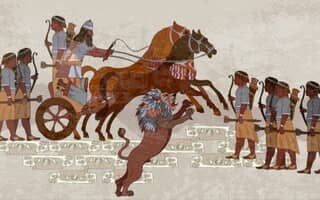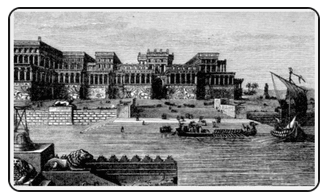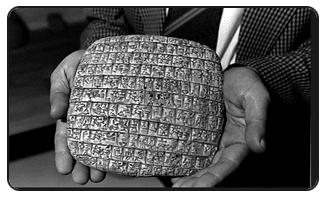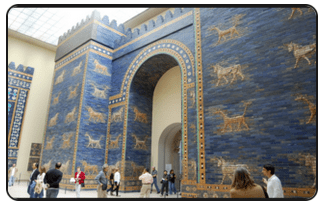Bible history - The Old Great Empires, Study Tools & Timelines
The Rise of the Akkadians
By Joshua Rapp Learn
Archaeological Discoveries and the Bible Fallen Empires researches significant discoveries from ancient empires.
The world's first empire arose from the Middle East's Fertile Crescent — and created a blueprint that other conquering rulers would follow for millennia.
Photo: (Credit: matrioshka/Shutterstock) Read more... »
The Euphrates River Dried Up And This Mysterious Cave Appeared Read more... »
Assyria Documentary
Archaeological Discoveries and the Bible Fallen Empires researches significant discoveries from ancient empires.
Some of the remains that archaeologists might find are things like written documents, cylinder seals, coins, pottery, sculpture, tools, weapons, jewelry, objects of art, religious objects, inscriptions on things like clay tablets or stone bas-reliefs, or monuments. Sometimes archaeologists excavate buildings, or palaces, and even sunken ships. Sometimes entire cities or portions of cities have been uncovered. Read more... »
Ancient Civilizations: Egypt
This ancient stone is called the Narmer Palette, and it's about 5,000 years old!
It tells the story in hieroglyphics (picture-writing) of the victory of Upper Egypt over Lower Egypt. This victory allowed a man named Narmer to unite the southern
and northern kingdoms of Egypt into one kingdom over which, of course, he was to be the ruler! You might think "Upper Egypt" was the northern part and "Lower Egypt" the southern part, but it was actually the other way around! The southern part was called
Upper because it had a lot of uplands and hills. The northern part had more valleys, so it was called Lower. Read more... »
The Ebla Tablets
Archaeologists knew from their study of Sumerian, Akkadian and Egyptian texts that there had been once an ancient assyrian empire called Ebla. In 1964 a young graduate of Rome University, Paolo Matthiae and his team uncovered the remains of a city under what was known as Tell Mardikh (pictured) some 30 km south of Aleppo in northern Syria. The tell was identified during their excavation of 1968, when they unearthed a male statue containing a 26-line inscription with the words; dedicated to Ibbit -Lim, son of Ikris-Hepa, King of Ebla. Read more... »
Who’s Who in the Empires of the Bible
By Steven Britt
The Bible recounts the rise and fall of mighty kingdoms and vast empires, primarily through the lens of their relationship to biblical Israel and Judah. The story follows Israel’s oppression, rise to prominence, destruction and subjugation. Ultimately, Bible prophecy tracks the progression of world empires even to modern times and beyond—to the Kingdom of God at the second coming of Jesus Christ. Read more... »
The Assyrian Empire
The Assyrian Empire was a collection of united city-states that existed from 900 B.C.E. to 600 B.C.E., which grew through warfare, aided by new technology such as iron weapons.
The 7th Century Assyrian King Ashurbanipal built his luxurious palace on the banks of the Tigris River, the main water source for the king and his many subjects in the Assyrian capital of Nimrud.
Photograph by Heritage Images Continue reading... »
Babylonia ancient region, Mesopotamia
Written by The Editors of Encyclopaedia Britannica
Babylonia, ancient cultural region occupying southeastern Mesopotamia between the Tigris and Euphrates rivers (modern southern Iraq from around Baghdad to the Persian Gulf). Because the city of Babylon was the capital of this area for so many centuries, the term Babylonia has come to refer to the entire culture that developed in the area from the time it was first settled, about 4000 bce. Before Babylon’s rise to political prominence (c. 1850 bce), however, the area was divided into two countries: Sumer in the southeast and Akkad in the northwest. >Read more... »
Israël and Judah
After the family of Israel moved to Egypt, it soon grew into a nation of two to three million people. Being delivered from bondage in Egypt,
God gave them the land of Canaan according to His promise to Abraham (Genesis 12:7). It would take another 400 years after the Exodus before Israel would become
a monarchy and major power in that part of the world.
Under the reign of King David and his son and successor, Solomon, the nation ascended to the apex of its power and influence. The land of Israel is situated ideally
at the meeting point of three continents—Europe, Africa and Asia. Read more... »
Proof of biblical kings of Israel, Judah deciphered on Jerusalem rock inscriptions
What a University of Haifa professor of biblical studies and ancient history has called “one of the most important archaeological discoveries in Israel of all time”
– five monumental, new royal inscriptions of King Hezekiah of Judah, which together include dozens of lines and hundreds of letters – have now been deciphered.
Prof. Gershon Galil, a former chairman of the university’s department of Jewish history, said that the inscriptions mention the name of Hezekiah, and summarize his main
actions during the first 17 years of his reign, including the water project (the cutting of the Siloam Tunnel and the pool), Read more... »
Nebuchadnezzar The Evil Babylonian King Who Destroyed Jerusalem
Written by Avrohom Bergstein
Nebuchadnezzar, son of Nabopolassar the Chaldean, was the Babylonian ruler who reigned over much of the civilized world in 604-562 BCE.
Nebuchadnezzar is notorious for decimating the Jewish presence in the Land of Israel, exiling the vast majority of its denizens to Babylon, and destroying the first Holy Temple. Read more... »
The Incredible Journey
By a remarkable turn of events, Daniel the hostage became Daniel the Prime Minister of Babylon, and the king’s most trusted adviser.
In fact he prospered under the reign of four kings. How did he do it? How did he survive 70 years of captivity? His secret of inner spiritual strength will provide us with the key to surviving the challenges of life, and more importantly the end-time. Find out more in our new program: The Captive.
![]() The Incredible Journey Daniel 1 2 3 4
The Incredible Journey Daniel 1 2 3 4
The Persian Empire
The Persian Empire is the name given to a series of dynasties centered in modern-day Iran that spanned several centuries—from the sixth century B.C. to the twentieth century A.D. The first Persian Empire, founded by Cyrus the Great around 550 B.C., became one of the largest empires in history, stretching from Europe’s Balkan Peninsula in the West to India’s Indus Valley in the East. Read more... »
Image courtesy: Borna Mir/Getty Images... »
CYRUS THE GREAT - Conquest of Babylon, and his Downfall
THE CONQUEST OF BABYLON Following on from his further conquests of lands surrounding the Tigris and Euphrates rivers, Cyrus fixed his attention onto Babylon. Cyrus found the demotion of the city’s patron deity Marduk and the forced labour of the citizens disgruntling. This too angered the Babylonian people, who turned against their king, having no reason to really oppose Cyrus as he had already built a reputation of not killing or enslaving those who yielded to him. Read more... »
Image courtesy: Ruthless facts about Cyrus The Great... »
Ancient Greek civilization
Written by Simon Hornblower Professor of Classics and Ancient History, University of Oxford.
Ancient Greek civilization, the period following Mycenaean civilization, which ended about 1200 bce, to the death of Alexander the Great, in 323 bce.
It was a period of political, philosophical, artistic, and scientific achievements that formed a legacy with unparalleled influence on Western civilization. Read more... »
Image courtesy: Peisistratus, copper engraving, 1832.Interfoto/Alamy... »
Roman Empire
Written by The Editors of Encyclopaedia Britannica
Roman Empire, the ancient empire, centred on the city of Rome, that was established in 27 bce following the demise of the Roman Republic and continuing to the final eclipse of the Empire of the West in the 5th century ce. Read more... »
Image courtesy: Puente Medieval Besians .. »
Kingdom-busting volcanoes linked to the rise of the Roman Empire
By Andy Coghlan
You won’t find it in history textbooks, but the Roman Empire’s rise to dominance in Egypt and the Middle East may have been influenced by a series of volcanic eruptions that reduced rainfall. These eruptions could have contributed to the sabotage and destruction of the Ptolemaic Kingdom on the Nile, paving the way for the rise of the Roman Empire. Read more... »



